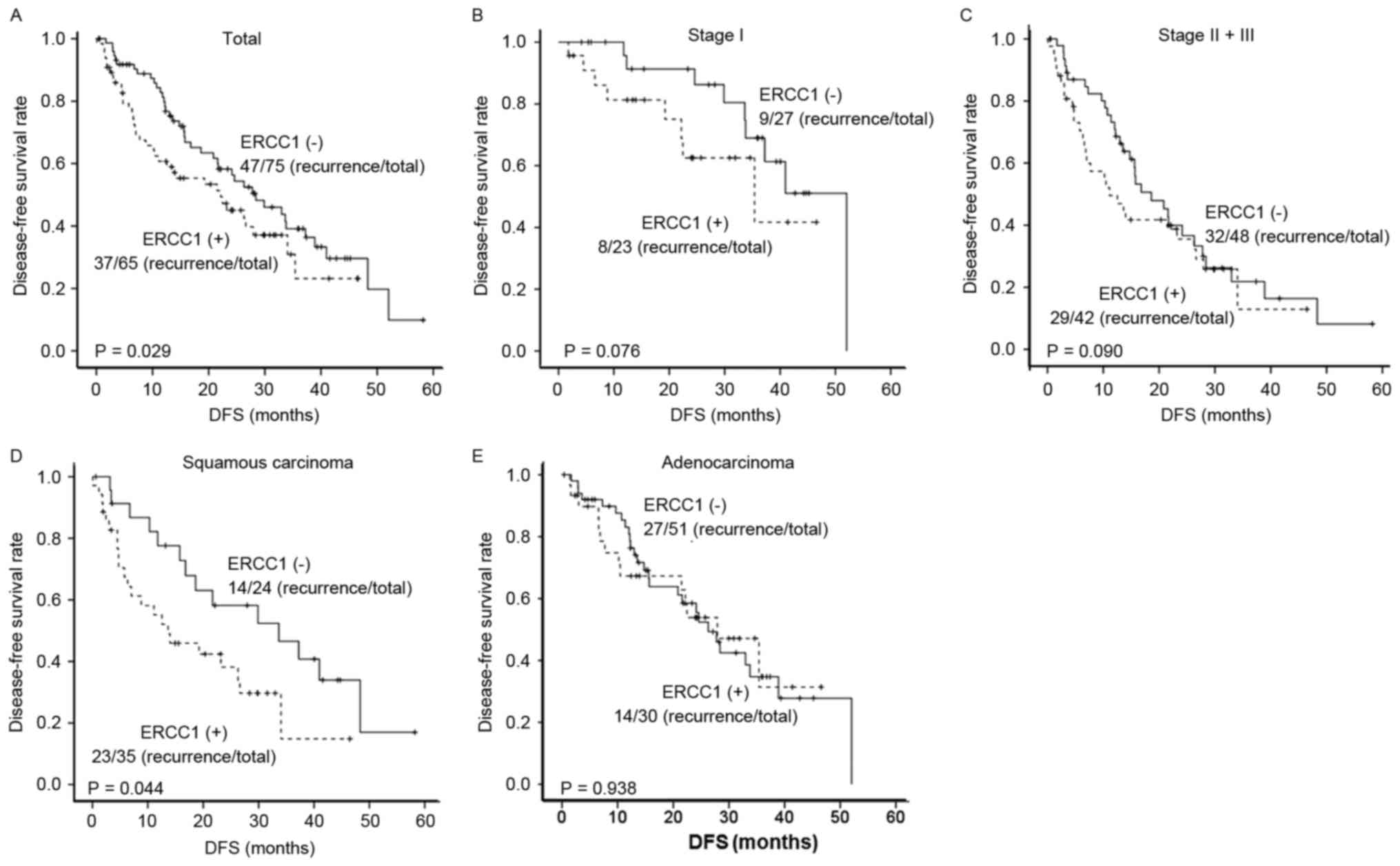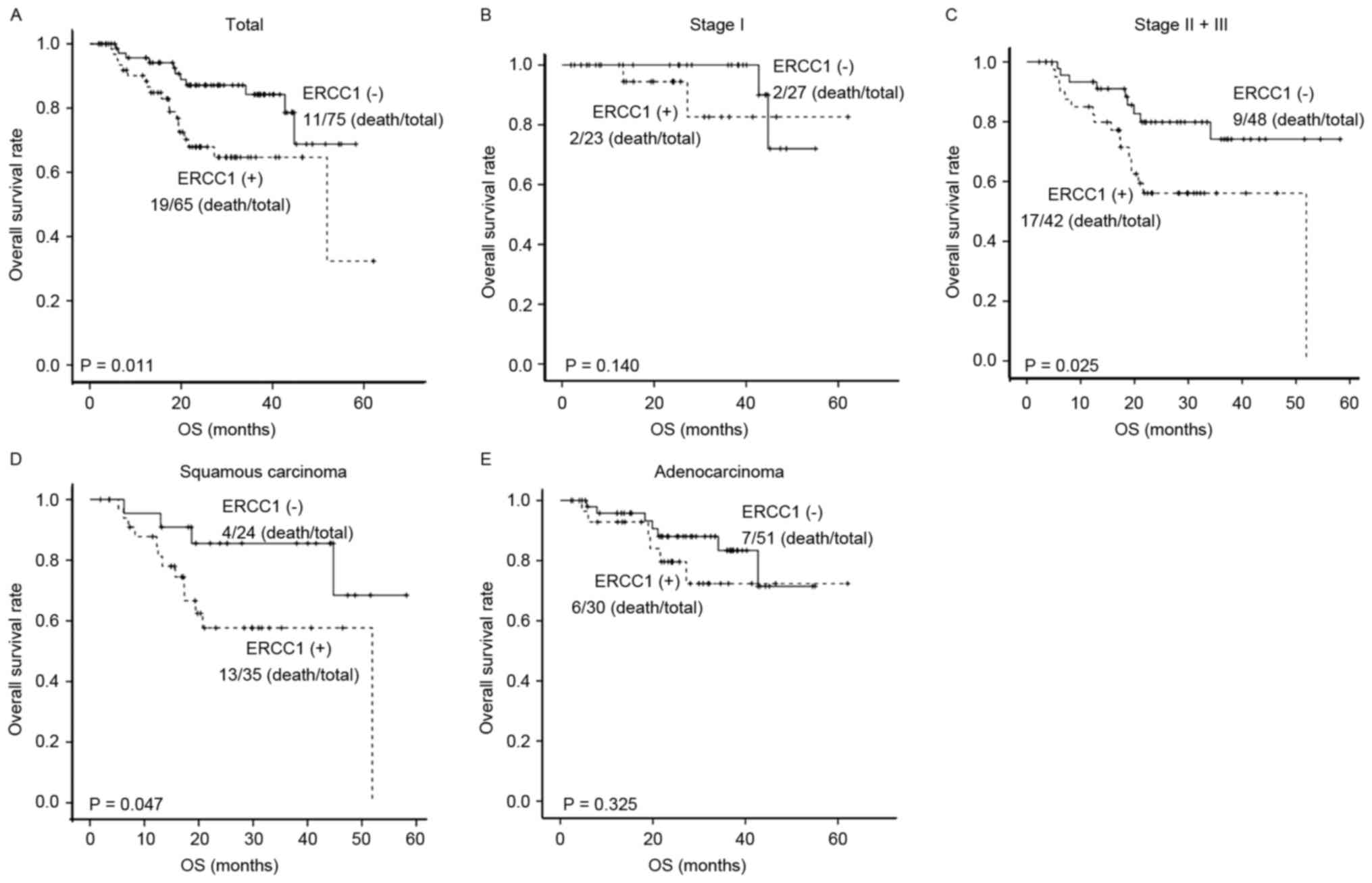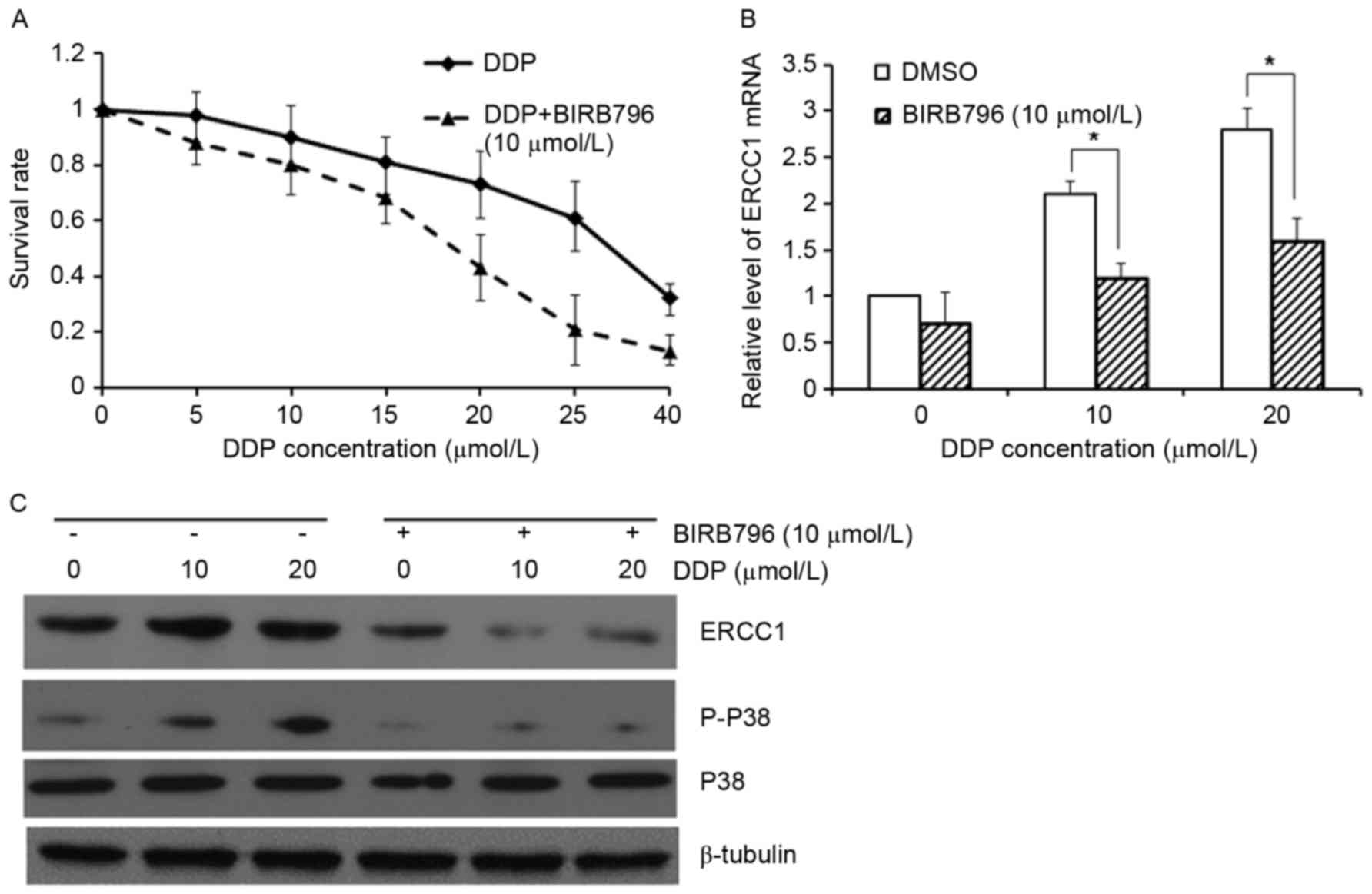|
1
|
Le Chevalier T: Adjuvant chemotherapy for
resectable non-small-cell lung cancer: Where is it going? Ann
Oncol. 7:(Suppl 7). vii196–vii198. 2010.
|
|
2
|
He YW, Zhao ML, Yang XY, Zeng J, Deng QH
and He JX: Prognostic value of ERCC1, RRM1 and TS proteins in
patients with resected non-small cell lung cancer. Cancer Chemother
Pharmacol. 75:861–867. 2015. View Article : Google Scholar : PubMed/NCBI
|
|
3
|
Geredeli C, Artac M, Yildirim S, Inal A,
Dede I, Guler T, Boruban MC, Koral L, Karaagac M, Zamani AG, et al:
Prognostic value of ERCC1, ERCC2, XRCC1, and TP53 single nucleotide
polymorphisms in patients with early-stage non-small cell lung
cancer. Tumour Biol. 36:4279–4285. 2015. View Article : Google Scholar : PubMed/NCBI
|
|
4
|
Pierceall WE, Olaussen KA, Rousseau V,
Brambilla E, Sprott KM, Andre F, Pignon JP, Le Chevalier T, Pirker
R, Jiang C, et al: Cisplatin benefit is predicted by
immunohistochemical analysis of DNA repair proteins in squamous
carcinoma but not adenocarcinoma: Theranostic modeling by NSCLC
constituent histological subclasses. Ann Oncol. 23:2245–2252. 2012.
View Article : Google Scholar : PubMed/NCBI
|
|
5
|
Bepler G, Zinner RG, Moon J, Calhoun R,
Kernstine K, Williams CC, Mack PC, Oliveira V, Zheng Z, Stella PJ,
et al: A phase 2 cooperative group adjuvant trial using a
biomarker-based decision algorithm in patients with stage I
non-small cell lung cancer (SWOG-0720, NCT00792701). Cancer.
120:2343–2351. 2014. View Article : Google Scholar : PubMed/NCBI
|
|
6
|
Kalikaki A, Voutsina A, Koutsopoulos A,
Papadaki C, Sfakianaki M, Yachnakis E, Xyrafas A, Kotsakis A,
Agelaki S, Souglakos J, et al: ERCC1 SNPs as potential predictive
biomarkers in non-small cell lung cancer patients treated with
platinum-based chemotherapy. Cancer Invest. 33:107–113. 2015.
View Article : Google Scholar : PubMed/NCBI
|
|
7
|
Sad LM, Younis SG and Elity MM: Prognostic
and predictive role of ERCC1 protein expression in locally advanced
stage III non-small cell lung cancer. Med Oncol. 31:582014.
View Article : Google Scholar : PubMed/NCBI
|
|
8
|
Sullivan I, Salazar J, Majem M, Pallarés
C, Del Río E, Páez D, Baiget M and Barnadas A: Pharmacogenetics of
the DNA repair pathways in advanced non-small cell lung cancer
patients treated with platinum-based chemotherapy. Cancer Lett.
353:160–166. 2014. View Article : Google Scholar : PubMed/NCBI
|
|
9
|
Papadaki C, Sfakianaki M, Ioannidis G,
Lagoudaki E, Trypaki M, Tryfonidis K, Mavroudis D, Stathopoulos E,
Georgoulias V and Souglakos J: ERCC1 and BRAC1 mRNA expression
levels in the primary tumor could predict the effectiveness of the
second-line cisplatin-based chemotherapy in pretreated patients
with metastatic non-small cell lung cancer. J Thorac Oncol.
7:663–671. 2012. View Article : Google Scholar : PubMed/NCBI
|
|
10
|
Cobo M, Isla D, Massuti B, Montes A,
Sanchez JM, Provencio M, Viñolas N, Paz-Ares L, Lopez-Vivanco G,
Muñoz MA, et al: Customizing cisplatin based on quantitative
excision repair cross-complementing 1 mRNA expression: A phase III
trial in non-small-cell lung cancer. J Clin Oncol. 25:2747–2754.
2007. View Article : Google Scholar : PubMed/NCBI
|
|
11
|
Roth JA and Carlson JJ: Prognostic role of
ERCC1 in advanced non-small-cell lung cancer: A systematic review
and meta-analysis. Clin Lung Cancer. 12:393–401. 2011. View Article : Google Scholar : PubMed/NCBI
|
|
12
|
Li CF, Cao S and Meng SD: Tumor dormancy
and identification of therapeutic targets. Ai Zheng. 28:555–558.
2009.(In Chinese). PubMed/NCBI
|
|
13
|
Paillas S, Boissière F, Bibeau F, Denouel
A, Mollevi C, Causse A, Denis V, Vezzio-Vié N, Marzi L, Cortijo C,
et al: Targeting the p38 MAPK pathway inhibits irinotecan
resistance in colon adenocarcinoma. Cancer Res. 71:1041–1049. 2011.
View Article : Google Scholar : PubMed/NCBI
|
|
14
|
Wen J, Cheng HY, Feng Y, Rice L, Liu S, Mo
A, Huang J, Zu Y, Ballon DJ and Chang CC: P38 MAPK inhibition
enhancing ATO-induced cytotoxicity against multiple myeloma cells.
Br J Haematol. 140:169–180. 2008. View Article : Google Scholar : PubMed/NCBI
|
|
15
|
Ranganathan AC, Adam AP, Zhang L and
Aguirre-Ghiso JA: Tumor cell dormancy induced by p38SAPK and
ER-stress signaling: An adaptive advantage for metastatic cells?
Cancer Biol Ther. 5:729–735. 2006. View Article : Google Scholar : PubMed/NCBI
|
|
16
|
Ranganathan AC, Zhang L, Adam AP and
Aguirre-Ghiso JA: Functional coupling of p38-induced up-regulation
of BiP and activation of RNA-dependent protein kinase-like
endoplasmic reticulum kinase to drug resistance of dormant
carcinoma cells. Cancer Res. 66:1702–1711. 2006. View Article : Google Scholar : PubMed/NCBI
|
|
17
|
He D, Zhao XQ, Chen XG, Fang Y, Singh S,
Talele TT, Qiu HJ, Liang YJ, Wang XK, Zhang GQ, et al: BIRB796, the
inhibitor of p38 mitogen-activated protein kinase, enhances the
efficacy of chemotherapeutic agents in ABCB1 overexpression cells.
PLoS One. 8:e541812013. View Article : Google Scholar : PubMed/NCBI
|
|
18
|
Hubner RA, Riley RD, Billingham LJ and
Popat S: Excision repair cross-complementation group 1 (ERCC1)
status and lung cancer outcomes: A meta-analysis of published
studies and recommendations. PLoS One. 6:e251642011. View Article : Google Scholar : PubMed/NCBI
|
|
19
|
Planchard D, Domont J, Taranchon E, Monnet
I, Tredaniel J, Caliandro R, Validire P, Besse B, Soria JC and
Fouret P: The NER proteins are differentially expressed in ever
smokers and in never smokers with lung adenocarcinoma. Ann Oncol.
20:1257–1263. 2009. View Article : Google Scholar : PubMed/NCBI
|
|
20
|
Shi Z, Tiwari AK, Shukla S, Robey RW,
Singh S, Kim IW, Bates SE, Peng X, Abraham I, Ambudkar SV, et al:
Sildenafil reverses ABCB1- and ABCG2-mediated chemotherapeutic drug
resistance. Cancer Res. 71:3029–3041. 2011. View Article : Google Scholar : PubMed/NCBI
|
|
21
|
Planchard D, Camara-Clayette V, Dorvault
N, Soria JC and Fouret P: p38 mitogen-activated protein kinase
signaling, ERCC1 expression, and viability of lung cancer cells
from never or light smoker patients. Cancer. 118:5015–5025. 2012.
View Article : Google Scholar : PubMed/NCBI
|
|
22
|
Seetharam RN, Sood A, Basu-Mallick A,
Augenlicht LH, Mariadason JM and Goel S: Oxaliplatin resistance
induced by ERCC1 up-regulation is abrogated by siRNA-mediated gene
silencing in human colorectal cancer cells. Anticancer Res.
30:2531–2538. 2010.PubMed/NCBI
|
|
23
|
Ueda S, Shirabe K, Morita K, Umeda K,
Kayashima H, Uchiyama H, Soejima Y, Taketomi A and Maehara Y:
Evaluation of ERCC1 expression for cisplatin sensitivity in human
hepatocellular carcinoma. Ann Surg Oncol. 18:1204–1211. 2011.
View Article : Google Scholar : PubMed/NCBI
|
|
24
|
Liu GY, Qu QX, Mi RR and Qi J:
Relationship between nucleotide excision repair gene ERCC1 and
resistance to cisplatin in ovarian cancer. Zhonghua Zhong Liu Za
Zhi. 30:184–187. 2008.(In Chinese). PubMed/NCBI
|
|
25
|
Cheong HT, Hui CW, Xu F, Mok TSK and Wong
CH: Abstract 2558: The mechanistic study on the effect of
platinum-based chemotherapy efficacy imposed by EGFR-TKI regulated
ERCC1 in non-small cell lung cancer (NSCLC). Cancer Res.
75:25582015. View Article : Google Scholar
|
|
26
|
Olaussen KA, Dunant A, Fouret P, Brambilla
E, André F, Haddad V, Taranchon E, Filipits M, Pirker R, Popper HH,
et al: DNA repair by ERCC1 in non-small-cell lung cancer and
cisplatin-based adjuvant chemotherapy. N Engl J Med. 355:983–991.
2006. View Article : Google Scholar : PubMed/NCBI
|
|
27
|
Wei Q, Cheng L, Amos CI, Wang LE, Guo Z,
Hong WK and Spitz MR: Repair of tobacco carcinogen-induced DNA
adducts and lung cancer risk: A molecular epidemiologic study. J
Natl Cancer Inst. 92:1764–1772. 2000. View Article : Google Scholar : PubMed/NCBI
|
|
28
|
Marwick JA, Kirkham PA, Stevenson CS,
Danahay H, Giddings J, Butler K, Donaldson K, Macnee W and Rahman
I: Cigarette smoke alters chromatin remodeling and induces
proinflammatory genes in rat lungs. Am J Respir Cell Mol Biol.
31:633–642. 2004. View Article : Google Scholar : PubMed/NCBI
|
|
29
|
Yao H, Edirisinghe I, Rajendrasozhan S,
Yang SR, Caito S, Adenuga D and Rahman I: Cigarette smoke-mediated
inflammatory and oxidative responses are strain-dependent in mice.
Am J Physiol Lung Cell Mol Physiol. 294:L1174–L1186. 2008.
View Article : Google Scholar : PubMed/NCBI
|
|
30
|
Zhong CY, Zhou YM, Douglas GC, Witschi H
and Pinkerton KE: MAPK/AP-1 signal pathway in tobacco smoke-induced
cell proliferation and squamous metaplasia in the lungs of rats.
Carcinogenesis. 26:2187–2195. 2005. View Article : Google Scholar : PubMed/NCBI
|
|
31
|
Bolton SJ, Pinnion K, Oreffo V, Foster M
and Pinkerton KE: Characterisation of the proximal airway squamous
metaplasia induced by chronic tobacco smoke exposure in
spontaneously hypertensive rats. Respir Res. 10:1182009. View Article : Google Scholar : PubMed/NCBI
|


















